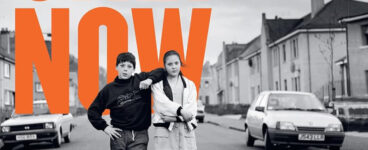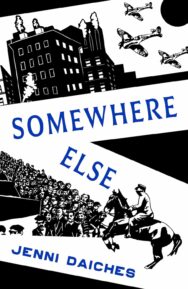‘A man is no more than his exhausted lungs. A woman is only the lesions on her arms, a child her bent and stick-like legs.’
Somewhere Else is an epic generational tale by Jenny Daiches exploring womanhood and Judaeo-Scottish experience across two World Wars, the creation of Israel, and the fall of the Berlin Wall. It’s a novel which explores today’s most difficult and urgent questions, not least of which: how to find identity in displacement.
Somewhere Else
By Jenny Daiches
Published by Scotland Street
There are not enough doctors. The food is poor and strictly rationed. It is hard to see people as anything beyond their suffering. A man is no more than his exhausted lungs. A woman is only the lesions on her arms, a child her bent and stick-like legs. But a man who wants to form an orchestra comes to Dr Esther one evening when she is smoking a cigarette outside the building that serves as a hospital. ‘There must be a piano somewhere,’ he says. ‘A cello maybe. Woodwinds would be very fine.’ He is in his fifties but looks older, his hair white and thin, his eyes dark and deep. He walks with a limp. He speaks English slowly and softly. ‘We cannot just sit and wait,’ he says with a tired smile. ‘We have all died. Music will help us to live again.’
He asks Esther her name and where she is from. ‘Now I am from nowhere,’ he says when she tells him. ‘We are all from nowhere. It is good to have a Scottish name. And Esther… Now that is a Jewish name, you know, a name from the Old Testament. Esther saves her people but at a terrible cost. It is a story of revenge against those who would destroy the Jews. Hundreds of the enemy were slaughtered. And we Jews celebrate it with feasts. When I was a child we dressed in fancy clothes and made a play, a Purim spiel. We ate hamantaschen, Haman’s ears. Haman is the villain, you know.’ He lowers himself onto the step at the hospital door. ‘And you must share your food at Purim, and give to the poor.’ He stares up at the sky. ‘Ach, but my legs are sore and tired.’
‘Can I help?’ Esther asks.
‘Only if you can make the last six years disappear.’ He rubs his leg. ‘But maybe you say we have enough of a miracle.’
Esther looks puzzled. He holds up both his hands and moves his fingers. ‘See? I have ten fingers. The blood still moves.’ He stares for a moment at his ten fingers. ‘A terrible revenge, and then there is feasting and dancing. No feasts for us, but dancing, maybe.’
‘I know the story of Esther,’ Esther says. ‘My bobeshi told it to me.’
‘What? In Scotland? You speak Yiddish in Scotland?’
‘Hardly. But it was my mother’s first language.’
‘Ah. So there are Jews in Scotland. But I shouldn’t be surprised – those Yids, they get everywhere.’ And he gives an abrupt laugh. ‘But you are Dr Mackintosh. You must have a Scottish father.’
‘He died in the last war, before I was born.’
The man nods, as if he already knows the story. Esther drops the end of her cigarette and grinds it with her heel. She looks down at the scattering of cigarette ends around the step.
‘A baby was born last night,’ she says.
‘A healthy child, a healthy mother?’
‘I think they will both be fine.’
‘That is something to thank God for.’ He struggles to get to his feet. Esther puts out her hand to help him and he takes it. Although he is slight and his hand is thin, she feels his weight tugging through her.
‘You still believe in God?’
‘Hmm, from time to time. He can be… what is the right word? Hard to find?’
‘Elusive?’
‘Ah, yes, elusive, a good word.’ He straightens up, puts one foot tentatively in front of the other. ‘I enjoyed our conversation, Dr Mackintosh.’
‘Please call me Esther.’
‘Esther. She was very brave. She defied the persecutors.’
She watches as he moves slowly away. After a few yards he stops and turns. ‘Don’t forget the piano,’ he calls. ‘And a clarinet. Oh, and an accordion please. We have an accordionist but no accordion.’
The next morning she walks the short distance to the hospital where there are already several dozen people waiting, mostly women and children. She is all right as long as she is working, as long as there is a human being in front of her who needs her attention. She is all right even when she sees that the old woman with the swollen arm – it is clearly broken – has not long to live. The arm must be seen to as if it will mend before she dies, as if there are not children who might survive to be adults if more can be done for them. Some argue that the children should come first.
‘The old ones will die soon, whatever we do.’
‘They have been through terrible times. We should try and make their last days as comfortable, as pain-free, as we can.’
‘We should be thinking of the future.’
‘We owe the old some peace, surely, some peace before they die.’
It is in the evenings that Esther feels a weight like a boulder on her chest, a sensation like a vice gripping her head. She is too tired even to talk. The senior doctor pours several inches of vodka into a tin cup but Esther shakes her head when he offers her some and asks, ‘Where can I find a piano?’
He takes a long swallow of vodka and puts the cup down on the desk. ‘It wouldn’t
surprise me if there’s a piano in the commandant’s quarters. Shall we go and look?’ He picks up the tin cup and takes another long swallow, then peers into it before setting it down.
They walk through the dusk to the commandant’s house, now occupied by officials from UNRRA. Yes, they say, we moved it into the back. They had to make space for filing cabinets. Esther and the senior doctor find it almost blocking a dimly lit passageway. The piano is thickly covered in dust with cardboard boxes filled with papers stacked on top.
The next day a wagon is found and four men persuaded to volunteer assistance. They carry the piano along the narrow passage and through the back door. It is a struggle to heave it on to the wagon and lie it on its back. The horse dozes, untroubled by the bumps and swearing going on behind it. One man takes the bridle and the horse begins to plod slowly along the rutted and pock-marked road that leads to the hospital. The other men follow and are joined by a handful of children who turn their progress into a procession. It is half a mile to the hospital and the children accompany the cart the whole way and watch as the four men manoeuvre the piano off the cart and carry it into the building. They set it down in the nearest convenient place, against a wall at the entrance, a waiting area always crowded with the sick. A man with intense blue eyes gets to his feet and walks over to the piano. He lifts the lid, stares down at the keys, plays a few notes and shakes his head. Then, regardless of the discordant sounds that emerge, he plays the first few bars of ‘Maple Leaf Rag’. Someone calls out ‘encore’. He smiles and plays a few more bars, a rippling syncopated treble against the steady thump of the bass. He stops again. ‘Bravo.’ He plays the opening notes of ‘Wall Street Rag’, then is overcome by a rasping bout of coughing. He leans both hands against the top of the piano until the coughing subsides. He looks down at the keys as if he might start to play again, but then quickly shuts the piano. His seat has been taken, so he finds a space against the opposite wall and leans back with his eyes closed.
Somewhere Else by Jenny Daiches is published by Scotland Street in September, priced £13.99
ALSO IN THIS ISSUE

 Only Here, Only Now: Q & A with Tom Newlands
Only Here, Only Now: Q & A with Tom Newlands
‘I wanted to write a really vivid book that could tackle some heavy subject matters with warmth and …

 Queen Macbeth by Val McDermid
Queen Macbeth by Val McDermid
‘No expense had been spared, no stores left unplundered. Bellies would be grumbling with hunger to p …













